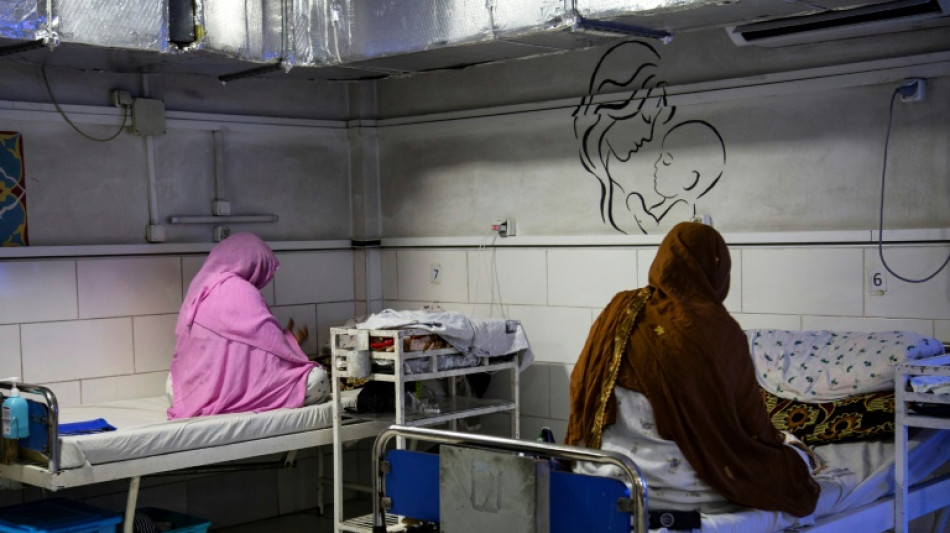
-
 England snap 15-year losing streak to win chaotic 4th Ashes Test
England snap 15-year losing streak to win chaotic 4th Ashes Test
-
Thailand and Cambodia agree to 'immediate' ceasefire

-
 Closing 10-0 run lifts Bulls over 76ers while Pistons fall
Closing 10-0 run lifts Bulls over 76ers while Pistons fall
-
England 77-2 at tea, need 98 more to win chaotic 4th Ashes Test

-
 Somalia, African nations denounce Israeli recognition of Somaliland
Somalia, African nations denounce Israeli recognition of Somaliland
-
England need 175 to win chaotic 4th Ashes Test

-
 Cricket Australia boss says short Tests 'bad for business' after MCG carnage
Cricket Australia boss says short Tests 'bad for business' after MCG carnage
-
Russia lashes out at Zelensky ahead of new Trump talks on Ukraine plan

-
 Six Australia wickets fall as England fight back in 4th Ashes Test
Six Australia wickets fall as England fight back in 4th Ashes Test
-
Man Utd made to 'suffer' for Newcastle win, says Amorim

-
 Morocco made to wait for Cup of Nations knockout place after Egypt advance
Morocco made to wait for Cup of Nations knockout place after Egypt advance
-
Key NFL week has playoff spots, byes and seeds at stake

-
 Morocco forced to wait for AFCON knockout place after Mali draw
Morocco forced to wait for AFCON knockout place after Mali draw
-
Dorgu delivers winner for depleted Man Utd against Newcastle

-
 US stocks edge lower from records as precious metals surge
US stocks edge lower from records as precious metals surge
-
Somalia denounces Israeli recognition of Somaliland

-
 The Cure guitarist and keyboard player Perry Bamonte dies aged 65
The Cure guitarist and keyboard player Perry Bamonte dies aged 65
-
Draper to miss Australian Open

-
 Police arrest suspect after man stabs 3 women in Paris metro
Police arrest suspect after man stabs 3 women in Paris metro
-
Former Montpellier coach Gasset dies at 72

-
 Trump's Christmas gospel: bombs, blessings and blame
Trump's Christmas gospel: bombs, blessings and blame
-
Russia lashes out at Zelensky ahead of new Trump meeting on Ukraine plan

-
 Salah helps Egypt beat South Africa and book last-16 place
Salah helps Egypt beat South Africa and book last-16 place
-
Australia's Ikitau facing lengthy lay-off after shoulder injury

-
 Another 1,100 refugees cross into Mauritania from Mali: UN
Another 1,100 refugees cross into Mauritania from Mali: UN
-
Guardiola proud of Man City players' response to weighty issues

-
 Deadly blast hits mosque in Alawite area of Syria's Homs
Deadly blast hits mosque in Alawite area of Syria's Homs
-
The Jukebox Man on song as Redknapp records 'dream' King George win

-
 Liverpool boss Slot says Ekitike reaping rewards for greater physicality
Liverpool boss Slot says Ekitike reaping rewards for greater physicality
-
Judge jails ex-Malaysian PM Najib for 15 more years after new graft conviction

-
 Musona rescues Zimbabwe in AFCON draw with Angola
Musona rescues Zimbabwe in AFCON draw with Angola
-
Zelensky to meet Trump in Florida on Sunday

-
 'Personality' the key for Celtic boss Nancy when it comes to new signings
'Personality' the key for Celtic boss Nancy when it comes to new signings
-
Arteta eager to avoid repeat of Rice red card against Brighton

-
 Nigeria signals more strikes likely in 'joint' US operations
Nigeria signals more strikes likely in 'joint' US operations
-
Malaysia's former PM Najib convicted in 1MDB graft trial

-
 Elusive wild cat feared extinct rediscovered in Thailand
Elusive wild cat feared extinct rediscovered in Thailand
-
Japan govt approves record budget, including for defence

-
 Seoul to ease access to North Korean newspaper
Seoul to ease access to North Korean newspaper
-
History-maker Tongue wants more of the same from England attack

-
 Australia lead England by 46 after 20 wickets fall on crazy day at MCG
Australia lead England by 46 after 20 wickets fall on crazy day at MCG
-
Asia markets edge up as precious metals surge

-
 Twenty wickets fall on day one as Australia gain edge in 4th Ashes Test
Twenty wickets fall on day one as Australia gain edge in 4th Ashes Test
-
'No winner': Kosovo snap poll unlikely to end damaging deadlock

-
 Culture being strangled by Kosovo's political crisis
Culture being strangled by Kosovo's political crisis
-
Main contenders in Kosovo's snap election

-
 Australia all out for 152 as England take charge of 4th Ashes Test
Australia all out for 152 as England take charge of 4th Ashes Test
-
Boys recount 'torment' at hands of armed rebels in DR Congo

-
 Inside Chernobyl, Ukraine scrambles to repair radiation shield
Inside Chernobyl, Ukraine scrambles to repair radiation shield
-
Bondi victims honoured as Sydney-Hobart race sets sail


'Dying every two hours': Afghan women risk life to give birth
Zubaida travelled from the rural outskirts of Khost in eastern Afghanistan to give birth at a maternity hospital specialising in complicated cases, fearing a fate all too common among pregnant Afghan women -- her death or her child's.
She lay dazed, surrounded by the unfamiliar bustle of the Doctors Without Borders (MSF)-run hospital, exhausted from delivery the day before, but relieved.
Her still-weak newborn slept nearby in an iron crib with peeling paint, the child's eyes lined with khol to ward off evil.
"If I had given birth at home, there could have been complications for the baby and for me," said the woman, who doesn't know her age.
Not all of the women who make it to the hospital are so lucky.
"Sometimes we receive patients who come too late to save their lives" after delivering at home, said Therese Tuyisabingere, the head of midwifery at MSF in Khost, capital of Khost province.
The facility delivers 20,000 babies a year, nearly half those born in the province, and it only takes on high-risk and complicated pregnancies, many involving mothers who haven't had any check-ups.
"This is a big challenge for us to save lives," said Tuyisabingere.
She and the some 100 midwives at the clinic are on the front lines of a battle to reduce the maternal mortality rate in Afghanistan, where having many children is a source of pride, but where every birth carries heavy risks -- with odds against women mounting.
Afghanistan is among the worst countries in the world for deaths in childbirth, "with one woman dying every two hours", UN spokesman Stephane Dujarric said earlier this month.
The Afghan health ministry did not respond to repeated requests for comment on this story.
According to the latest World Health Organization figures, from 2017, 638 women die in Afghanistan for every 100,000 viable births, compared with 19 in the United States.
That figure, moreover, conceals the huge disparities between rural and urban areas.
Terje Watterdal, country director for the non-profit Norwegian Afghanistan Committee (NAC), said they saw 5,000 maternal deaths per 100,000 births in remote parts of Afghanistan.
"Men carry the women over their shoulders, and the women die over the mountain trying to reach a hospital," he said.
- 'Brain drain' -
Before the return to power of the Taliban in August 2021 and the end of their insurgency, women would sometimes have to brave the frontlines to reach help, but now there are new challenges -- including a "brain drain" of expertise.
"A lot of gynaecologists have left the country," Watterdal said.
Moreover, Taliban authorities want to get rid of the mobile medical teams visiting women because "they cannot control the health messages they were giving", he said.
Under the Taliban government, women have been squeezed from public life and had access to education restricted, threatening the future of the female medical field in a country where many families avoid sending women to male doctors.
"Access to antenatal and postnatal care for a woman was (always) extremely complicated. It's even more complicated today," said Filipe Ribeiro, MSF director in Afghanistan.
This is due to measures taken by authorities as well as the failings of the healthcare system -- including structural support from foreign donors.
"What little there was has been put under even greater pressure," Ribeiro said.
The financial strain on families amid the country's economic crisis increases the risks, said Noor Khanum Ahmadzai, health coordinator for non-governmental organisation Terre des Hommes in Kabul.
In a public hospital where the midwives are overworked and poorly paid, women have to bring their own medicine.
A delivery costs around 2,000 Afghanis ($29) -- a significant sum for many families.
Despite the risks, "women who used to go to the public sector now prefer to deliver at home, because they don't have money", said Ahmadzai.
An estimated 40 percent of Afghan women give birth at home, but that shoots up to 80 percent in remote areas -- often with the help of their mother-in-law or a local matriarch, but sometimes alone.
- 'Mother died in childbirth' -
Islam Bibi, pregnant with triplets, went to the MSF facility in Khost in pain, and empty-handed.
"I was sick, my husband didn't have any money. I was told, 'Go to this hospital, they do everything for free'," said the 38-year-old, one of hundreds of thousands of Afghans who fled Pakistan in recent months, fearing deportation.
Multiple births like Islam Bibi's are common, said Tania Allekotte, an MSF gynaecologist from Argentina.
"It is valued here to have many children and many women take a treatment to stimulate their fecundity. We often have twins here," she told AFP.
The average woman has six children in Afghanistan, but multiple pregnancies, repeated caesarean sections or miscarriages increase the risk of death.
There are some rays of hope.
Women in neighbouring Paktia province may have fewer risks now, thanks to a first-of-its-kind maternity centre opened recently by NAC in the small provincial capital Gardez -- a clinic run by women for women.
"This type of clinic doesn't exist in the majority of provinces," Khair Mohammad Mansoor, the Taliban-appointed provincial health director, told the all-male audience.
"We have created a system for them in which sharia law and all medical principles will be observed."
The NAC facility aims to help "many of our sisters who live in isolated areas", manager Nasrin Oryakhil said, with similar clinics planned for four other provinces in the coming months.
Its walls freshly painted and decorated with posters promoting vitamins and iron for pregnant women, the small clinic is set up for 10 deliveries a day, said head midwife Momina Kohistani.
Keeping mothers alive as they bring new life into the world is close to home for her.
"My mother died in childbirth," she murmured, tears rolling down her cheeks.
T.Ward--AMWN



